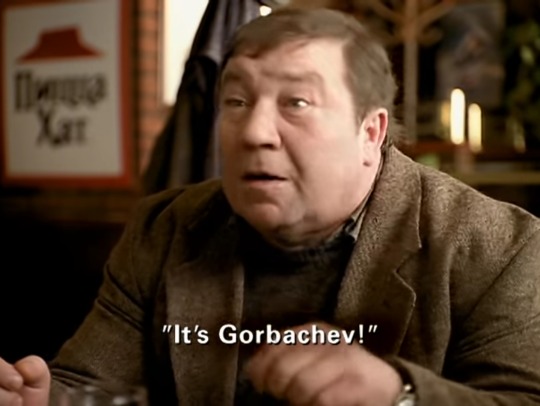#gorbachev
Text
She gorb on my chev till I die August 30th 2022
4K notes
·
View notes
Text
gorbachev’s funeral was a solemn affair kept purposefully small by an outsized police presence, ordered there by a regime that wants to distance itself as much as possible from his legacy but which cannot forsake something as momentous as the last general secretary of the ussr. at the same time, those in power hate the people who embrace gorbachev and what he stood for. therefore you have “elements of a state funeral,” a ridiculous amount of police, riot police, plainclothes police, military police, elaborate ways of making sure as few people show up as possible (gorbachev was supposed to lie in state until 2pm, but this was suddenly moved to noon; the burial was closed to the public, but it was actually open). one person was arrested for holding up an anti-war sign. surprisingly, many complained about putin snubbing the funeral due to “scheduling conflicts.” good riddance! who among those present really wanted to see him?
it was something of a quiet protest action against him and the war, even without posters. a pensioner at novodevichy cemetery told me as much: “this is the only way i can protest against what’s going on without getting arrested, and they know it. i couldn’t not take the opportunity.” but what is a protest if it’s sanctioned, quiet, and cordoned off?
at 9:30 am, crowds began to gather at the house of the unions in the city center, where all former soviet leaders were displayed in state. it was both larger than i’d expected and much smaller than i’d hoped for from moscow. from a city of 12 million, there were perhaps a few thousand people all together, many with red carnations. there were several gate systems to the memorial manned by cops who had orders not to let in more than 50 people at a time (i overheard one say so on his walkie-talkie). as with the the funeral procession later on, there was a good showing by the post-soviet generation and those who would’ve been too young to remember much of anything from the gorbachev years; there was also a fair amount of pensioners. the crowd moved fast—the cops didn’t want to let anyone linger for too long in any place—and after three security checkpoints and five gates, i was in the luxurious hall of pillars, though made austere for gorbachev. after seconds of looking at a man who embodied the twentieth century like few others, i was urged to move on as fast as possible. on the way out, a couple behind me, a man and a woman in their 50s, started crying. they were not the only ones.
across the street, a large “we will fulfill our mission” poster, written with the propaganda Zs and Vs, hangs on the scaffolding of the new bolshoi theatre, as if to put a period on what had already ended months, if not years ago. the crowds only became bigger when i left at half past ten. on my way to novodevichy cemetery, i ran into gennady zyuganov, head of russia’s communist party, and asked for a photo—why not. a smaller crowd of CPRF, left front, and other “left” parties gathered for some event near red square. later, i learned that he gave a speech celebrating the end of wwii with the victory over japan. zyuganov said that we must continue the fight and cleanse the earth of nazis, as russia is doing now. this, too, is part of gorby’s legacy, the shattered pieces of a massive, unfinished political project.
a few hours passed before gorbachev’s procession arrived to novodevichy, where the crowd was a bit thinner. i stood next to a young law student in his junior year who skipped his first day of classes to pay respects, chatting with him to pass the time. “how excellent that so many young people showed up,” he said. maybe a third of those gathered was under 30. “if we are here together, it means russia still has a future.” the police moved us around from time to time to “make space.” after finding my way to him again, i noticed he had two carnations instead of four: he gave two to a journalism student and exchanged numbers. a pensioner: “is she your sister? no? watch over her, keep each other safe.”
the procession was headed by a downcast dmitry muratov, a massive portrait of gorbachev in his hands: one nobel peace laureate parting with the other. among those present for the funeral service were ambassadors, including john sullivan from the US, the south korean, french, and german ambassadors, and suzanne massie, a historian who served as advisor to reagan and allegedly introduced him to the russian idiom “trust, but verify,” with pavel palazhchenko, gorbachev’s long-time translator.
after the service, a 21-gun salute, the crowds thronging to the burial by raisa gorbachev’s grave. alexei venediktov (editor-in-chief of the now-dissolved echo of moscow, another glasnost creation) recently talked about how he went to novodevichy with gorbachev around 2010. gorbachev started crying, telling him that all he wanted now was to be buried with raisa. the love he had for her was immense. out of all the biographies and gorbachev/perestroika studies i’ve read, it’s only taubman’s that covers how profoundly he loved her with the space that such a deep, lasting relationship merited.
during the burial: “who do you think is next,” from one pensioner to another, two strangers. “well... you know.” “yes, let’s hope it happens soon.”
a last opportunity to pay respects at a grave heaped, heaped, heaped on with roses and carnations, and then the throngs dissolved. it was the best of who and what you could see in moscow, or, russia’s conscience—what’s left of it—on public display. i have no doubt everyone at the memorial and the cemetery was anti-war. the palpable depression of this crowd was alleviated only by the reinforcing mutual presence of everyone there, a silent solidarity drawn from an organization that hasn’t been seen on the streets since march. you understand what people feel from what’s not said—the looks—the tears—the efforts of men and women in their 80s and 90s to stand for hours, so long as they could say farewell.
the possibility of such organization, reluctantly allowed for the funeral and which was widely admissible in years passed, was the legacy with which we parted today. the defining feature of gorbachev’s rule was openness, glasnost, a gust of fresh air blowing through a hot, humid room, more than economic ideas that were a halfway house for the conditions the soviet state found itself in, and which he didn’t fully understand. yet he opened windows and doors. he returned memory to the people, he allowed memorial to form, he brought sakharov from exile, and yes, he then turned off his microphone during the congress of people’s deputies. gorbachev was a complicated, flawed individual who rose through the ranks of a bloody, ruthless bureaucracy to lead an imperial superpower whose continued survival was his overarching political imperative. he couldn’t have been gandhi. at one point, he nearly killed yeltsin with nothing more than a prolonged party criticism session; he was, directly or indirectly, responsible for the deaths of those on the imperial periphery.
but what could have been instead? nothing is precisely inevitable. had andropov been healthier, the soviet union could’ve been held together to this day by sheer force, or perhaps by prolonged conflict in azerbaijan, or mass-scale repression in the baltics. set in this context, gorbachev leashed the security institutions of the ussr, but didn’t properly dispose of them. thirty years later, his failure is zyuganov’s gleeful speech on denazification, the descent into a fascist society waging genocidal war. his success was thirty years of lost opportunity.
where do we go from here? the feeling of helplessness predominates, resonating through the said and unsaid perception of what could have been and what we have had. the crowd goes home, the opposition stays in jail, the war continues.
780 notes
·
View notes
Text
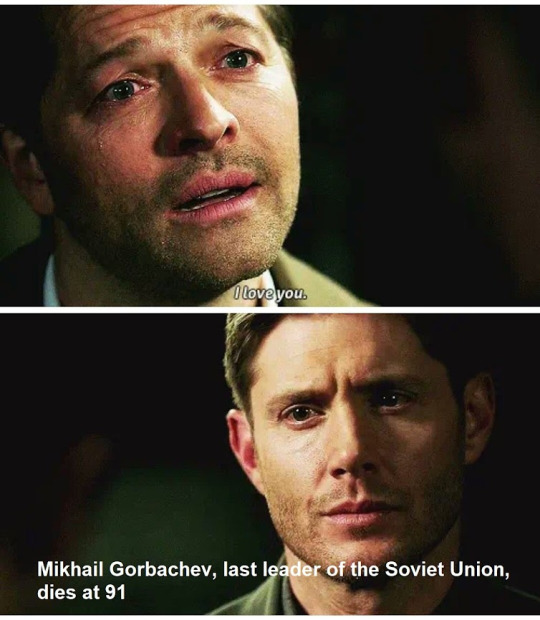
Sorry you had to find out this way, but this is Tumblr after all.
[id in alt text]
912 notes
·
View notes
Note
Why did I assume gorb was short for Gorbachev for a whole second until I saw the gorb picture
thats his legal name
35 notes
·
View notes
Text
For anyone mourning Gorbachev - thanks for showing how your West-centric views always allowed to completely ignore crimes committed against Eastern European and Central Asian nations. Also thanks for proving that it is indeed that ignorance, naivete, or perhaps even stupidity caused current Ukrainian war in the first place.
Because while Gorbachev personally ordered to murder peaceful protesters, some of whom were not even adults yet, you awarded him with a Nobel peace prize for Berlin wall that he considered "a mistake".
He personally ordered to run over with tanks and shoot at peaceful civilians in Vilnius, Tbilisy, Baku, and others.
So while you mourn his rotten, crimes against humanity committing body, we, people who had to spill blood for our independence because Gorby couldn't let go of his imperialism, going to celebrate today.
And the biggest cause for celebration in Lithuania is the fact that our first post-USSR leader, a man who tried to reach out to Gorbachev while his soldiers killed innocent protesters, outlived him. And I hope in his last moments Gorby thought of it.
Freedom won!
592 notes
·
View notes
Text

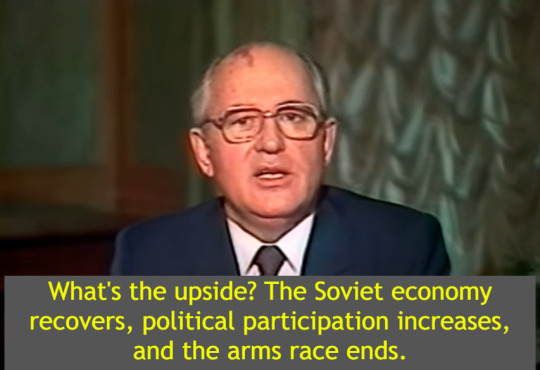
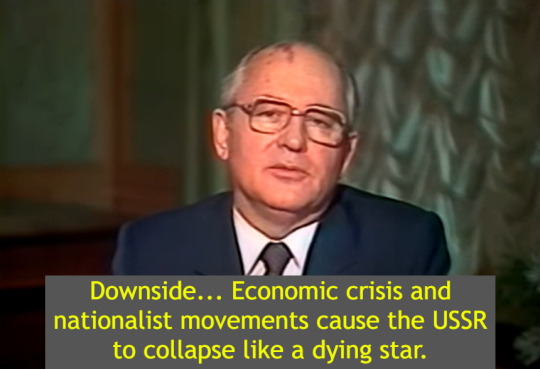
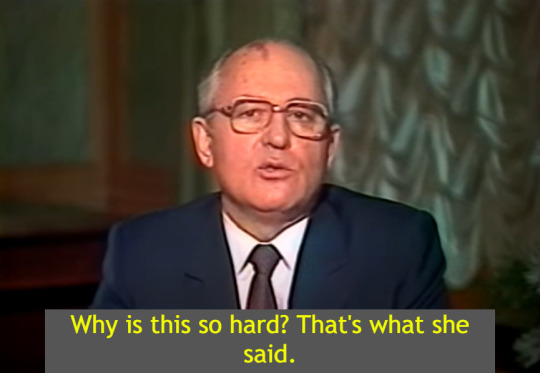
#socialism#communism#marxism#politics#anti capitalism#soviet union#history#mikhail gorbachev#Gorbachev#perestroika#glasnost#USSR
50 notes
·
View notes
Text
By far the most common response I'm seeing to Gorbachev's death is, "He was still alive?"
382 notes
·
View notes
Text

Brezhnev, Gorbachev, Chernenko, Andropov.
Four secretaries general in one frame before the parade on November 7, 1981 in Moscow.
8 notes
·
View notes
Text
This week on “everything is homestuck”, Goncharov is just squiddles all over again.
57 notes
·
View notes
Text

baseball cap
la gorra
Picture ’Gorby’ (Mikhail Gorbachev) with a baseball cap, or Gordon Gekko, Gordon Gould, Gordon Downie, Gordon Ramsay, Gordon Sumner (Sting)…
Imagine a gory baseball cap, the owner keeps wearing it because it’s his favorite.
How many caps do you have?
¿Cuántas gorras tienes?
Picture by The Official CTBTO Photostream on Flickr
#baseball cap#baseball#cap#gorra#Gorby#gorbachev#gordon#Gekko#Gould#Downie#ramsay#Sumner#Sting#gorbachov#gordon gekko#gordon gould#gordon downie#gordon ramsay#gordon sumner#spanish#vocabulary#vocab#español#hint#mem#mnemonic#wotd#word of the day
3 notes
·
View notes
Text
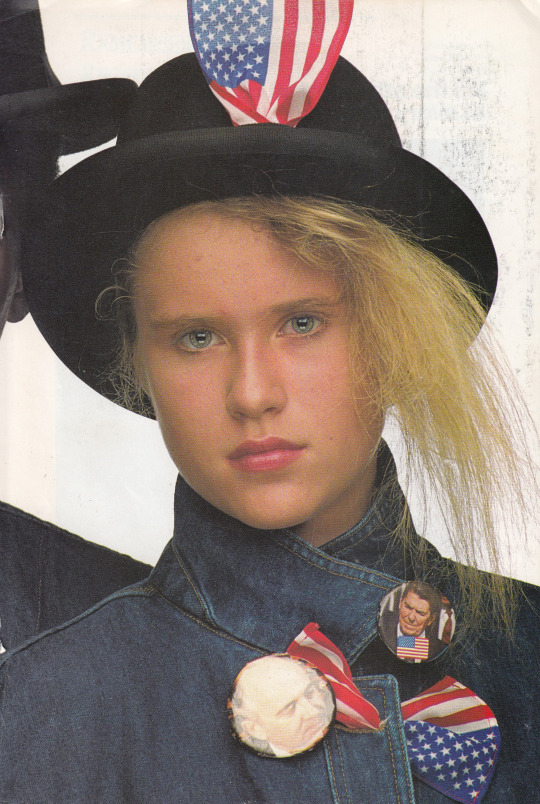
National Geographic, May 1984
Scan
9 notes
·
View notes
Text
For those crying over Gorbachev, here's a reminder that he was a violent imperialist and, just like Putin, a KGB project:
Here is Gorbachev with one of the bloodiest criminals in USSR - long-term KGB head and briefly head of the communist party Y. Andropov.
Remember the USSR-US relationship in the 70s and 80s? Well, Andropov was behind it all.
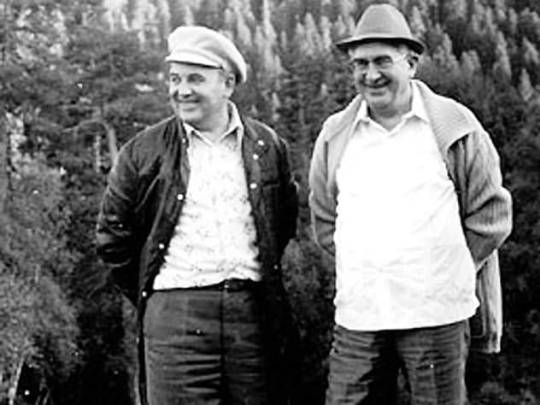
But as USSR economy was going down, Andropov practically invented Gorbachev. They were close pals, with Andropov even considering Gorbachev as his successor in the KGB, but then thought that he would be more useful in politics.

From 1969 to Andropov's death in 1984 - Gorbachev owed it all to him. Not only that, but Perestroika was also designed as a KGB trick to warm up relations with the West in return of their economic help.
It was never Gorbachev's intention to break the Berlin wall. If you read the documents it was all a matter of miscommunication between the upper and the lower management.
It was never Gorbachev's intention to break USSR - he thought he was saving it by playing friends with the West in exchange for cash that a declining Soviet empire desperately needed. KGB was in on this.
He showed clearly that he's no different by attempting to keep separating republics in the Soviet influence by force and bloodshed.
And despite all that, this KGB creation, this despicable man whose hands are covered in blood of peaceful civilians he ordered to kill, the West awarded him a Nobel peace prize.
And just a decade later they were willing to fully embrace yet another KGB man - Vladimir Putin.
105 notes
·
View notes
